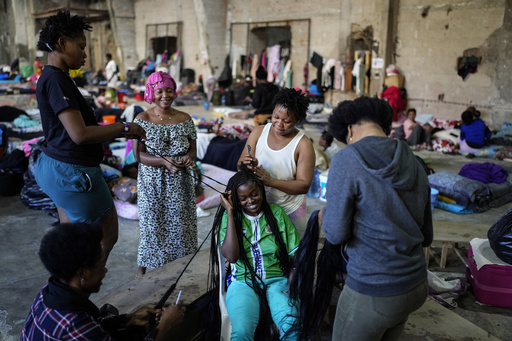Isatta Bah, a 24-year-old mother from Sierra Leone, stirs from her nap in a crowded shelter located on the outskirts of Beirut, where she clutches her one-year-old child, Blessing. She spends her days anxiously awaiting an exit visa that could facilitate her return to her homeland. Bah’s desire to reunite with her family stems from her traumatic experiences in Lebanon, including exploitative working conditions, sexual violence, and the recent turmoil of war.
“My time in Lebanon has been incredibly difficult for me. I feel exhausted,” Bah expressed. “All I want is to go home.” This sentiment is shared by numerous migrant workers in Lebanon who are hoping to be repatriated following the ceasefire that concluded a lengthy 14-month conflict between Hezbollah and Israel last month.
Lebanon has attracted numerous migrant workers seeking better lives for their families, seduced by the allure of steady employment and fair wages. However, many find themselves caught in a harsh reality under the Kafala sponsorship system, which typically results in withheld wages, long working hours, and, for many, various forms of abuse. While human rights organizations have consistently criticized the Kafala system, the Lebanese government seldom takes action to address these issues. Bah was unaware of these concerns when she arrived in Lebanon in 2022, lured by an offer of a job at a supermarket with a promised salary of $200 a month. Instead, she was assigned to care for an elderly woman.
Tragedy struck within weeks of her arrival when her three-year-old son back home became seriously ill and died. Denied time to grieve, Bah fled her employer’s home, leaving behind her passport and other vital documents that were confiscated by her employer. Her ordeal worsened when, one day, a taxi driver who she believed was taking her and five housemates home instead dropped them off at an unfamiliar location. As they searched for another taxi, a group of men assaulted them.
“Men were coming, cheering,” Bah recounted, visibly shaken. “They beat us and violated us.” Following the attack, it took her nearly two weeks to regain her strength and return to work at two hotels. Lacking identification, many migrants, including Bah, often hesitate to turn to authorities for help.
The ongoing conflict intensified their already precarious situation. In September, as Israel ramped up bombings of southern Beirut, Bah, along with her baby and friends, fled the area on foot. Unfortunately, not all migrant workers were able to evade the violence. According to the U.N.’s International Organization for Migration (IOM), approximately 37 migrant workers have lost their lives and around 150 have been injured since October 2023.
For many migrants, finding a safe place became increasingly difficult. Government-run shelters frequently refused assistance to displaced individuals who were not Lebanese. Activist Dea Hage-Shaheen, who has provided support to migrant women during past crises, stepped in alongside other volunteers to assist. They repurposed an abandoned structure, previously a car dealership, into a shelter capable of accommodating over 200 women from Sierra Leone, including Bah.
The atmosphere in the shelter was lively, with women cooking and dancing to Nigerian music, while rows of thin mattresses filled the dimly lit space. Despite limited resources, the inhabitants worked together to create a makeshift Christmas tree out of sticks.
Instances of migrants being denied entrance to government-run shelters have been reported, and many fear being detained or deported, which discourages them from seeking help. As a result, many seek refuge with embassies, non-governmental organizations, and faith-based communities. The Lebanese government has not yet directly addressed the issue of migrant workers being turned away from shelters, even amidst consistent advocacy from rights organizations and the U.N.
Migrants face additional hurdles when attempting to leave the shelters, as many have had their passports and key documents taken by previous employers. “We had to obtain exit permits, immigration clearances, and even child travel documentation for five children in our group,” Shaheen said, who coordinated the repatriation of 120 women and children last month with the assistance of IOM, which organized the flights.
The IOM has reportedly received repatriation requests from around 10,000 migrants, which is a mere fraction of the estimated 175,000 foreigners residing in Lebanon. As of late November, IOM has assisted over 400 migrants in returning home, which included organized charter flights for individuals from Bangladesh and Sierra Leone. However, uncertainty looms regarding future flights or their destinations.
On November 19, joy echoed through the Beirut-Rafic Hariri International Airport as groups of Sierra Leonean women arrived, filled with excitement and anticipation. Some could even be seen dancing to commemorate their long-awaited departure. “My time in Lebanon has been incredibly tough,” stated Amanata Thullah, a migrant who had spent four years there. “I am elated to be heading back to my home country.”
Mariam Sesay, who identified herself as a leader within Sierra Leone’s community in Lebanon, noted the distress and trauma encountered by many in recent months. Although Bah was not on the flights, she expressed happiness for her friends returning home. She anxiously awaits her opportunity alongside over 50 others.
Initially, Bah was informed that she required formal documentation for her baby and the father’s consent to leave. However, her circumstances allowed a lawyer to waive this requirement. “I long to return home and continue my studies,” Bah shared. “Since childhood, I have aspired to be a computer science student because I have a knack for it.” Looking affectionately at her child, she added, “Now I have someone to care for. Watching her walk and laugh fills me with joy.”


